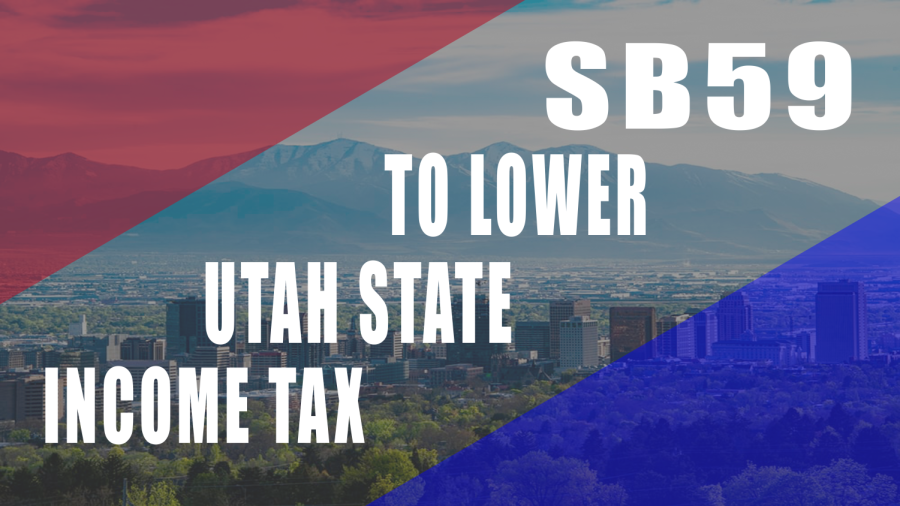Linnabary: Let’s Cut Taxes for Utahns
(Graphic by Emily Christensen | The Daily Utah Chronicle)
February 12, 2022
Before the 2022 legislative session started, Utah leaders made a promise to cut taxes for Utahns. Unlike many in the federal government, Utah leaders have wasted no time making good on the promises they made. This 2022 legislative session features several pieces of legislation that cut taxes for Utahns on an individual and collective basis, such as Gov. Spencer Cox’s grocery tax and Senate Bill 59. With the massive surplus we have in this fiscal year, Utah leaders should give some of that surplus back to Utahns in the form of tax cuts and tax credits.
On cutting taxes for individual Utahns, the Utah Senate passed S.B. 59 in late January 2022. This legislation changes the income tax rate for individuals and businesses from 4.95% to 4.85%. The bill’s Senate sponsor, Sen. Dan McCay, made a case for the bill, saying that the median family income in Utah is $72,000 a year. This cut would save that family about $98 more a year. While that may not seem like a significant number on paper, that money could mean a week of groceries or a car payment for many.
Unfortunately, Utah is behind in cutting taxes for its citizens, especially considering that Utahns have braved so much in the last two years with the pandemic. Colorado, our neighboring state, has steadily lowered its individual and business income taxes. In 2021, their income tax rate was 4.55%, with the state also considering a further decrease to 4.4%. These tax cuts in Colorado have given its residents more money to spend on groceries, car payments or whatever they determine necessary. Utahns deserve to have this financial flexibility.
As of the writing of this article, S.B. 59 has not been called to a vote on the House Floor. But the House should consider giving Utahns a tax cut. Many anticipate that the House will add to this tax cut legislation and could even expand the cuts. While S.B. 59 is a great piece of legislation in its own right, it fits into a larger theme of giving back to Utahns during this legislative session.
During his State of the State, Gov. Cox laid out his plan for giving back to Utahns. “Tonight, I am proposing an additional $160 million grocery tax credit for Utah families,” he said. Cox outlined the necessity for this given the nation’s soaring inflation, and he is correct. Inflation has caused prices to skyrocket on many household staples such as meat, coffee and milk.
While it’s on record that Senate Leadership is skeptical of this proposal, the rising cost of grocery store items makes a proposal worth considering this session. This proposed grocery tax credit would use the same surplus designated for a cut to the income tax rate, putting it in opposition to what the Senate has already passed. Hopefully, lawmakers can find a way to combine both policies to best deliver aid to Utahns.
If this round of tax cuts passes, this will mark the second year in a row where the state legislature will cut Utahns’ taxes. These compounding tax cuts should be celebrated. Utah is in its most robust fiscal condition ever and has continued to deliver high quality of life to its population. While cutting taxes remains a hallmark of Republican public policy, it’s a policy all should consider in times like this to give back to the population.
While one of the government’s fundamental duties is to provide for the public good, using public money, you as an individual always know your own needs better than anyone else. By cutting taxes, you allow the individual to have a little extra cash in their pocket so they can spend it in the way they see fit. Utah’s leaders understand this, and in such a diverse state like Utah, with large urban centers and mass rural country expenses, the people who call Utah home all have drastically different needs. When considering tax policy, we should leave as much revenue in the pockets of taxpayers as possible. This legislative session lets work to leave a little extra cash in the pockets of hard-working Utahns.










patrick shea • Feb 15, 2022 at 1:28 pm
Mr. Linnabary probably doesn’t understand the old adage -penny saved and a dollar lost. Given the poor, very poor funding for public education, the dismal, expensive health care system and continued unfettered support for unregulated growth and development with an increasing scarcity of water. We need the majority of this years more than a one billion dollar being spent on preparing for the future. The magic of the market, effective and efficient in some situations can correct societal problems. But, when it comes to sustaining our future and protecting the common ground we share, we must as our pioneer predecessors did, use public funds raised by taxes to prepare for the future.